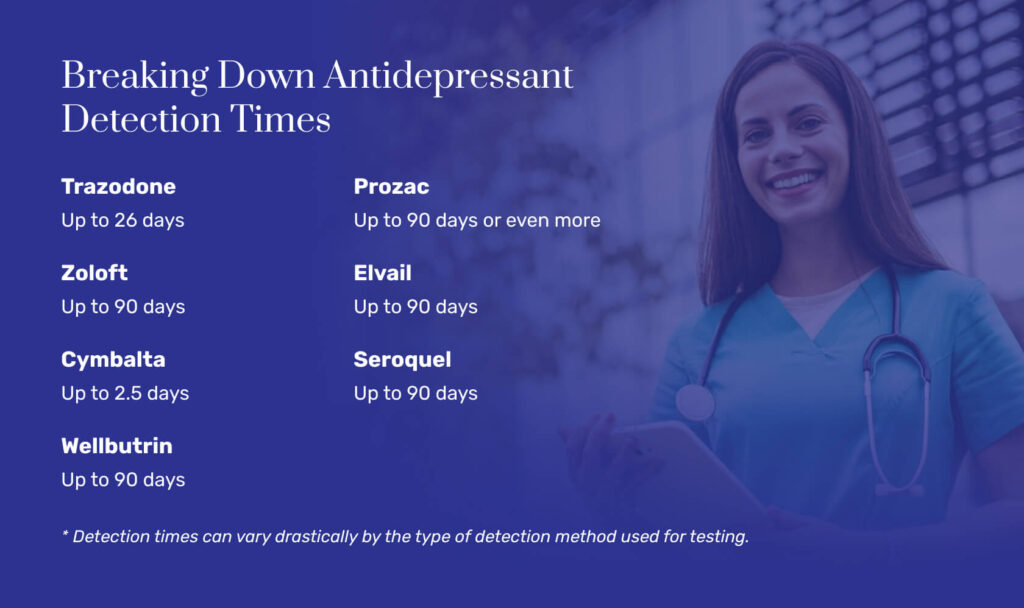Antidepressants stay in your system for days to weeks after you stop taking them. The specific timeframe will depend on the particular antidepressant, duration of use, average dose, and personal factors.
Factors That Affect Antidepressant Duration in Your Body
Are you or someone you know struggling with addiction?
I may have a problem I am concerned for a loved oneAntidepressants are designed to alter the uptake or production of neurotransmitters in some way to achieve a mood-stabilizing effect. These medications can remain in your system for several days or even weeks after your last dosage.
The main factors that influence how long antidepressants remain in your body include the following:
- Type of medication: Different medications have different clearance times. In general, selective serotonin reuptake inhibitors (SSRIs) have longer clearance times and take longer to be eliminated from the body than norepinephrine and dopamine reuptake inhibitors.
- Genetics and physical factors: Being older, having a larger body mass index (BMI), and having a genetic history of disorders affecting metabolism or organ functioning can increase the length of time antidepressants remain in your body.
- Consumption patterns: Consuming higher doses of antidepressants or taking these medications for extended periods of time provides more opportunity for traces of the active ingredients to accumulate in your system, thus requiring more time for them to be removed.
How Do Antidepressants Affect the Body?
Antidepressants work by either impeding the reuptake of serotonin, dopamine, or norepinephrine into the synapses of nerve cells, causing more free-floating availability to regulate mood and affect.
Over time, neurons in the brain adapt to the presence of these medications, and brain neurochemistry is altered. When the medication is removed, withdrawal can occur as the body one again adapts to its absence.

Antidepressant Detection Times
Different drugs have distinct clearance times and periods during which they are detectable through various testing methods. Discontinuation symptoms typically emerge within the first days to weeks of stopping the medication, but they have varying detection periods.
Drug tests don’t generally test for antidepressant use since they are not considered substances that people abuse. Some antidepressants trigger false positive results for other drugs, like amphetamines or benzodiazepines.
Trazodone Detection Times
Trazodone can potentially be detectable for up to 26 days in urine following the last dose, sometimes presenting as a false positive for amphetamines. In hair, trazodone may be detectable for up to 90 days or more.
The half-life of trazodone is approximately five to nine hours, so it remains in the bloodstream for approximately one to two days (four to five half-lives). Trazodone can remain in saliva for approximately the same amount of time as in the bloodstream.
Zoloft Detection Times
Zoloft may be detected in the urine for up to nine days following the last dose and up to 90 days in hair follicle tests. The medication is detectable in saliva for up to two days following the last dosage and up to five days in blood.
Cymbalta Detection Times
There are no current urine tests for Cymbalta. In hair follicle tests, Cymbalta can remain detectable for approximately 30 days or more.
The half-life of Cymbalta is 12 hours, meaning that it can be detected in the bloodstream for approximately 2.5 days following the last dose. As with urine, there are no saliva or buccal swab tests for Cymbalta.
Wellbutrin Detection Times
There is little research on the detectability of Wellbutrin in urine tests. This medication is known to be associated with a high rate of false positives for amphetamines. Wellbutrin can potentially show up in hair follicle tests for up to 90 days following the last dose.
The half-life of Wellbutrin (bupropion) is 21 hours, so the medication can be detected in the bloodstream and saliva for approximately 4.4 days.
Prozac Detection Times
Saliva and hair follicle tests are not viable testing options for Prozac. The drug has a long half-life and can potentially be detected in the bloodstream and urine for 90 days or more. Prozac may show up as a false positive for LSD or amphetamine in standard drug tests.
Elavil Detection Times
Elavil could potentially be detectable for up to five days in urine tests and 48 hours in saliva. The medication can remain in the bloodstream for two to four days following the last dose.
It may be detectable in hair follicles for up to 90 days. It takes approximately seven days following a dosage for Elavil to be detected in the hair.
Seroquel Detection Times
Seroquel (quetiapine) is detectable in the blood for up to two days, in the hair for up to 90 days, and in the urine for up to two days following the most recent consumption. Saliva tests for Seroquel are still being developed.
Quetiapine can cause a false positive test result for methadone.
Signs of Antidepressant Abuse
Antidepressants are not commonly abused since they don’t produce the euphoric or sedative sensations usually associated with drugs of abuse. Still, some people may abuse them in an effort to experience these feelings, or they may combine their use with other substances.
If you believe someone you know may be abusing antidepressants, look for these potential signs of substance abuse:
- Slurred speech
- Bloodshot eyes
- Confusion and dizziness
- Changes in appetite
- Financial troubles
- Reduced self-care behaviors
Using any medication outside the bounds of a prescription is abuse. If someone is misusing their prescription or illicitly using substances, it’s a sign that they need help. Antidepressant use comes with the potential for negative side effects. If you or someone you know experiences emotional numbness, suicidal thoughts, major mood changes, or withdrawal symptoms when stopping use, contact your prescribing doctor immediately.



